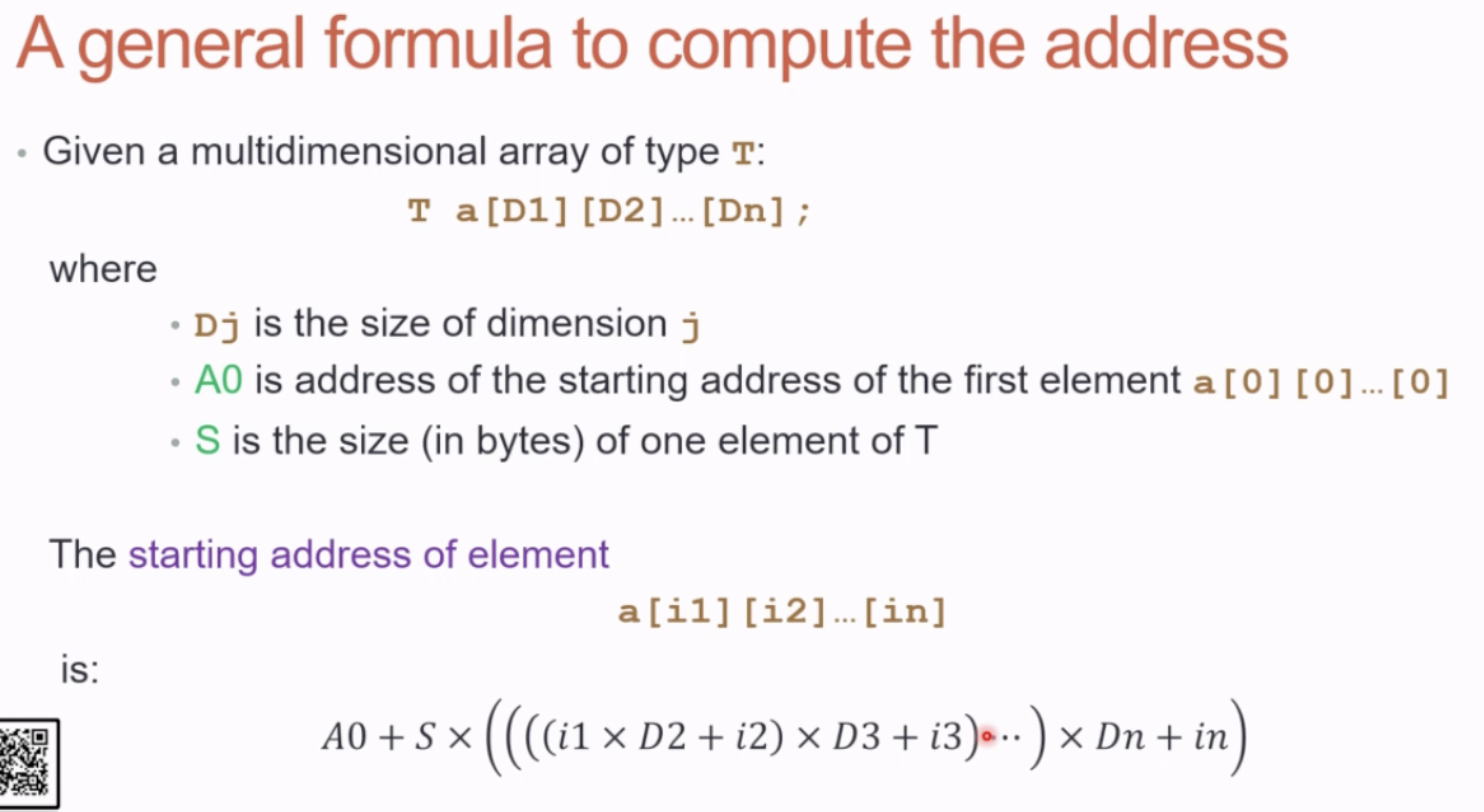Arrays in C
Arrays are homogeneous - their elements are all of the same type
Declaration: int c[30]
- occupy contiguous memory locations and are accessed through indexing
Can be initialised at the same time: int a[3] = {54, 9, 10};
- If fewer initial values are provided (compared to size), the remaining values will be initialised to zero
e.g. to populate an array with user input
int arr[100];
for (int i=0; i<10; i++) {
scanf("%d", &arr[i]);
}Array name refers to the address of the first element
int a[3]
printf("%p\n", a); // same as below
printf("%p\n", &a[0]); // same as above
printf("%p\n", &a[1]); // diff from aboveCopying arrays over is illegal in c, i.e. destArr = sourceArr since both are pointers pointing to the start of the array. Instead, you need to write a loop.
Name of array is not needed in function prototype. Hence both the following are accepted:
int sumArray(int [], int);
int sumArray(int arr[], int sie);- No ned to put array size, even if it is present, compiler would ignore it.
Since array name is a pointer, we can also have the alternative syntax:
int sumArray(int *, int);
int sumArray(int *arr, int size) {
...
}- Note that typically when functions are called, values are copied over in C.
- However, since array is a pointer, it means that a function can always modify the content of the array it receives. (whether intended)
Calculate Size
int arr = {1, 2, 3, 4, 5};
int size = sizeof(arr) / sizeof(arr[0]);sizeof()returns the size, in bytes, of a variable, data type or expression
Strings in C
- is an array of characters with a ‘\0’ (null character at the back)
#include <string.h>for functions to manipulate strings Initialising a String
char fruit_name[] = "apple"
char fruit_name[] = {'a', 'p', 'p', 'l', 'e', '\0'}Read screen from stdin
# reads size - 1 char or until new line
fgets(str, size, stdin)
# reads until white space
scanf("%s", str);Calculate length
#include <stdio.h>
#include <string.h> // Include the string.h header
int main() {
char myString[] = "Hello";
size_t length = strlen(myString);
printf("The string is: %s\n", myString);
printf("The length of the string is: %zu\n", length);
return 0;
}- use
strlenfrom<string.h>
Pointers
- You may refer to the address of a variable by using the address operator
& %pis the format specifier for address i.e.printf("%p", &a)- Initialising a pointer
int *a_ptr = &aaa - to access a variable through a pointer, you dereference a pointer
*a_ptrProblems with pointers - Two or more pointers can point to the same object
- No easy way to check if a pointer is valid
- Dangling Pointers
Incrementing a pointer
- incrementing a pointer will increment the pointer’s address by the size of the type of the pointer
- int takes 4 bytes
- float takes up 4 bytes
- char takes up 1 byte
- double takes up 8 bytes
Turning a multidimensional array into a one-dimensional one Required for storing multi-dimensional array in memory
- Row Major Order
- store row by row by row
- Column Major Order
- store column by column by column

- store column by column by column
Structures
Allow grouping of heterogeneous members declaration of structure type
typedef struct {
int day, month, year;
} date_t;
typedef struct {
int cardNum;
date_t expiryDate
}- Types are not variables
- Types need to be defined before we can declare a variable
- declaration + initialisation + accessing
card_t card = {88888, {31, 12, 2020}};
card.expiryDate.yearCan do assignments with structures. ie. struct1 = struct2
Structures in functions
void change_name_and_age(player_t *player_ptr) {
strcpy((*player_ptr).name, "Alexandra");
(*player_ptr).age = 25;
}Since syntax like (*player_ptr).name appear very often, an alternative syntax created for it is the -> operator. I.e. player_ptr->name
Misc
enum Heat {
LOW,
MEDIUM,
HIGH
}- represents a group of integer constants
Types
size_t: unsigned integer
Identifiers
%zu:zto specify that argument is of typesize_t,uto indicate that argument should be printed as an unsigned decimal integer.